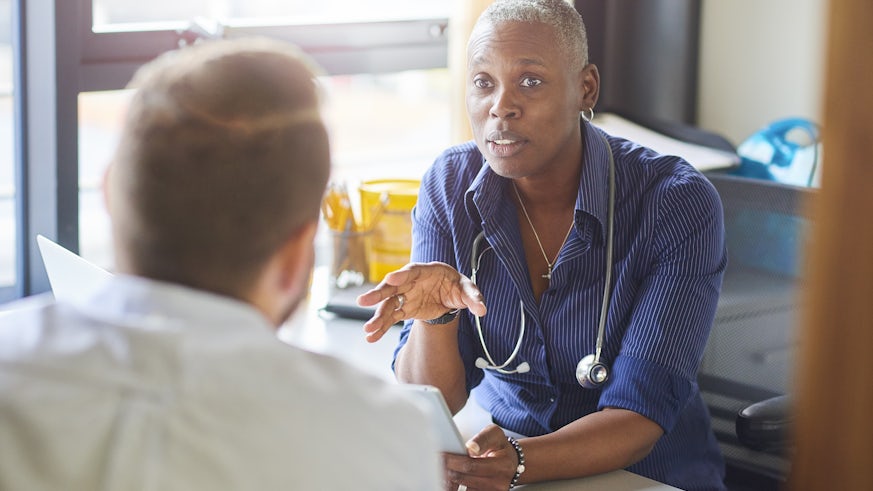Nearly half of people with potential cancer symptoms in first wave of pandemic did not contact GP, study finds
25 February 2021

Nearly half of people who experienced possible cancer symptoms in the first wave of the COVID-19 pandemic did not contact their GP, the initial findings of a UK-wide survey have suggested.
The research was carried out by Cardiff University and Cancer Research UK, with preliminary findings focusing on the experiences of 7,543 people from March to August 2020.
Possible cancer symptoms were commonly experienced during the first wave, the survey found, with 40.1% of participants (3,025 people) saying they had experienced at least one potential symptom.
Of those who experienced symptoms, a substantial proportion (44.8%) reported not contacting their GP for any symptom, even for red flags such as coughing up blood (30.7% of those who experienced this symptom did not seek help), an unexplained lump or swelling (41% did not seek help) or a change in the appearance of a mole (58.6% did not seek help).
A policy briefing paper on the findings released today calls for coordinated campaigns across the UK to highlight that NHS services are open safely for anyone with unusual or persistent symptoms.
Principal investigator Professor Kate Brain, a health psychologist from Cardiff University’s School of Medicine, said people had “put their health concerns on hold to protect the NHS”.
The policy briefing paper also outlines:
- More than two-thirds of respondents reported feeling safe from COVID-19 if they needed to attend an appointment at their GP (68.2%) or hospital (61.2%) – but nearly three quarters (72.3%) were worried about delayed cancer tests and investigations due to COVID;
- Worry about wasting healthcare professionals’ time (15.4%), worry about putting extra strain on the NHS (12.6%), not wanting to be seen as someone who makes a fuss (12%), difficulty with access to healthcare services (10.3%) and worry about catching COVID-19 (9.6%) were reported as barriers to seeking medical help. In contrast, remote consulting was not a common barrier to medical help-seeking (4.8%).
Thirty participants were also interviewed about their experiences:
- They described putting concerns on hold to avoid burdening the NHS – however when they contacted their GP, they were pleased with the care received and wanted to keep remote GP consultations as an option in the future alongside face-to-face consultations;
- They expressed some level of fear or nervousness about attending primary care services – and bigger fears around attending secondary care relating to catching or passing on the virus. However, those who did attend face-to-face in primary and/or secondary care described feeling “safe” and “secure” when doing so.
Professor Brain said: “From the early data we collected after the first lockdown we can see that the COVID-19 pandemic has affected public attitudes to seeking help for signs and symptoms of cancer which may translate into delayed referrals, missed tests and later-stage diagnosis.
“This suggests the government’s message to ‘stay home, protect the NHS, save lives’ which was intended to control the spread of COVID-19, also sent a strong message to the public that cancer can wait. While we recognise that measures to control the spread of COVID-19 are essential, we also need to send a strong and clear message that cancer cannot wait, that people should contact their GP with any unusual or persistent symptoms and that NHS services are open safely.”
The report recommends that further work is needed to make clear that NHS services are open safely.
It concludes that clear information is needed to encourage confidence in contacting the GP promptly, explaining the changes to GP practice procedures and what to expect at a consultation, and to alleviate worries about NHS capacity and infection control.
Michelle Mitchell, Cancer Research UK’s chief executive, said: “Catching cancer at an early stage gives the best possible chance of surviving the disease so we’re extremely concerned people have put off seeking help for cancer symptoms, even if this was for the best of intentions. Worryingly we don’t yet know what the pandemic’s long-term impact on cancer stage and survival will be, so it’s vital people don’t delay contacting their GP if they notice any unusual changes to their body.
“NHS staff have worked incredibly hard to manage the increased strain COVID-19 has put on an already stretched system but the government must protect cancer services if we’re to avoid the real possibility that cancer survival could go backwards for the first time in decades.”
Dr Neil Smith, Cancer Research UK’s GP adviser, said: “GPs across the UK are doing everything we can to ensure people get the care they need so if you’ve noticed an unusual or persistent symptom, tell your doctor, we do want to hear from you. In most cases it won’t be cancer, but if it is, catching it early gives the best chance of successful treatment. For those who’ve been unable to get through to your doctor’s surgery, although it might be frustrating, I would encourage you to keep trying, GPs like me are still here to help you.”
Research and analyses will be carried out to understand how attitudes to cancer screening and health behaviours change over time. The findings of this survey will shortly be published as a pre-print, with the research team aiming to publish in a journal this year.
The research, which is expected to run for 18 months, is being carried out by Cardiff University and Cancer Research UK, along with King’s College London, the University of Surrey and Public Health Wales. It is funded by the Economic and Social Research Council as part of UK Research and Innovation’s rapid response to COVID-19.
